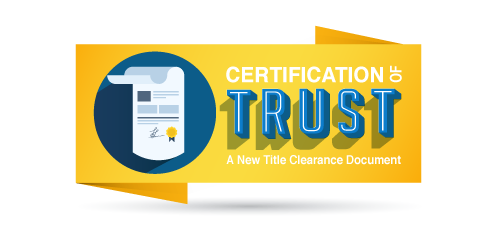By Douglas M. Karlen
Vice President and Regional Counsel
Chicago Title Insurance Company
DOWNLOAD THE ARTICLE HERE.
Since August 10, 2015, trustees of personal trusts have enjoyed the benefits of a new statute that protects the privacy of trust information. An amendment to the Trusts and Trustees Act reduces, or even eliminates, the need for a trustee to deliver a copy of a personal trust agreement to anyone other than a beneficiary. See Public Act 99-337 (SB 1877), effective August 10, 2015, codified at new 760 ILCS 5/8.5. The new section creates a Certification of Trust upon which third parties may rely. In doing so, Illinois joins several other states that protect the privacy of trust information and documents.
New Section 8.5 applies to personal trusts (revocable, irrevocable, living, etc.). It does not apply to Illinois land trusts. For example, it does not apply if title to real estate is vested in an institutional trustee, such as the Chicago Title Land Trust Company.
Title companies have adjusted title examining and clearance practices to accommodate the new Certification of Trust.
THE CERTIFICATION OF TRUST
Instead of furnishing a copy of the trust instrument to a person other than the beneficiary, the trustee may furnish to the person a Certification of Trust. A Certification of Trust form is set out at 760 ILCS 5/8.5(j), but use of this statutory form is not mandatory. Like the statutory form, however, a non-statutory Certification of Trust must contain the following information:
- A statement that the trust exists and the date the trust instrument was executed;
- The identity of the settlor;
- The identity and address of the currently acting trustee;
- The powers of the trustee;
- The revocability or irrevocability of the trust, whether the trust is amendable or unamendable, and the identity of any person holding a power to revoke or amend the trust;
- The authority of co-trustees to sign or otherwise authenticate and whether all or less than all are required in order to exercise powers of the trustee;
- The trust’s taxpayer identification number; and
- The manner of taking title to trust property.
See 760 ILCS 5/8.5(a).
A Certification of Trust need not include the dispositive terms of the trust, 760 ILCS 5/8.5(d), but it must include a statement that the trust has not been revoked, modified, or amended “in any manner that would cause the representations contained in the certification of trust to be incorrect.” 760 ILCS 5/8.5(c). One or more of the trustees must sign the Certification, and the recipient (third party) may require an acknowledgement. 760 ILCS 5/8.5(b).
The recipient of a Certification of Trust may require the trustee to furnish a copy of excerpts from the original trust instrument and applicable amendments. These excerpts, however, may only be of those portions of the documents that (1) designate the trustee and (2) confer upon the trustee the power to act in the pending transaction. 760 ILCS 5/8.5(e).
The new Section contains two provisions protecting third parties who rely in good faith on a Certification of Trust. First, 760 ILCS 5/8.5(f) provides:
A person who acts in reliance upon a certification of trust without knowledge that the representations contained therein are incorrect is not liable to any person for so acting and may assume without inquiry the existence of the facts contained in the certification. Knowledge of the terms of the trust may not be inferred solely from the fact that a copy of all or part of the trust instrument is held by the person relying upon the certification.
Second, 760 ILCS 5/8.5(g) provides:
A person who in good faith enters into a transaction in reliance upon a certification of trust may enforce the transaction against the trust property as if the representations contained in the certification were correct.
Finally, the new Section imposes penalties on third parties who, in bad faith, demand full disclosure of a trust instrument. A person who demands the full trust instrument in addition to a Certification of Trust and allowed excerpts is liable for damages if a court finds that the person did not act in good faith. 760 ILCS 5/8.5(h). Certain parties are exempted from liability, but these exemptions are not relevant in the title insurance context.
TITLE EXAMINING AND CLEARANCE PROCEDURES
The Certification of Trust is not a mandatory document. A trustee may still choose to deliver a copy of the trust agreement to a title insurer or other third party. Nonetheless, to avoid allegations of bad faith and the potential for liability, Chicago Title Insurance Company (the Company) has modified its examining and clearance procedures.
When title is vested (or, to be vested) in the trustee of a personal trust, the Company generally raises two title exceptions relating to the trust. First, the Company raises an exception for the terms of the trust. Second, the Company raises an exception calling for a copy of the trust agreement and any amendments thereto. This second exception has been modified to call for:
- A Certification of Trust executed by the trustee in accordance with 760 ILCS 5/8.5, together with excerpts of the trust agreement and amendmends thereto relating to the designation of trustees and the powers of the trustees to act in the current transaction, or,
- In the alternative, the trustee, in his or her sole discretion, may deliver to the Company a full copy of the trust agreement together with all amendments thereto.
The Company reserves the right to require additional items or make further requirements after review of the above-requested documentation.
For clearance purposes, the Company’s first choice, as indicated above, is to receive a Certification of Trust. If the Certification of Trust shows a clear and simple status of the trust and of the trustee, then the allowed excerpts may not be necessary. Requirement of excerpts will be left to underwriter discretion. On the other hand, the Company may only accept a full copy of the trust agreement if it is voluntarily delivered by the trustee in lieu of a Certification of Trust.
We trust that the above scheme strikes an appropriate balance between the Company’s need for information and the privacy rights of parties to a trust agreement.
For a sample Certification of Trust, consult your Chicago Title contact or view the statute at www.ilga.gov.


